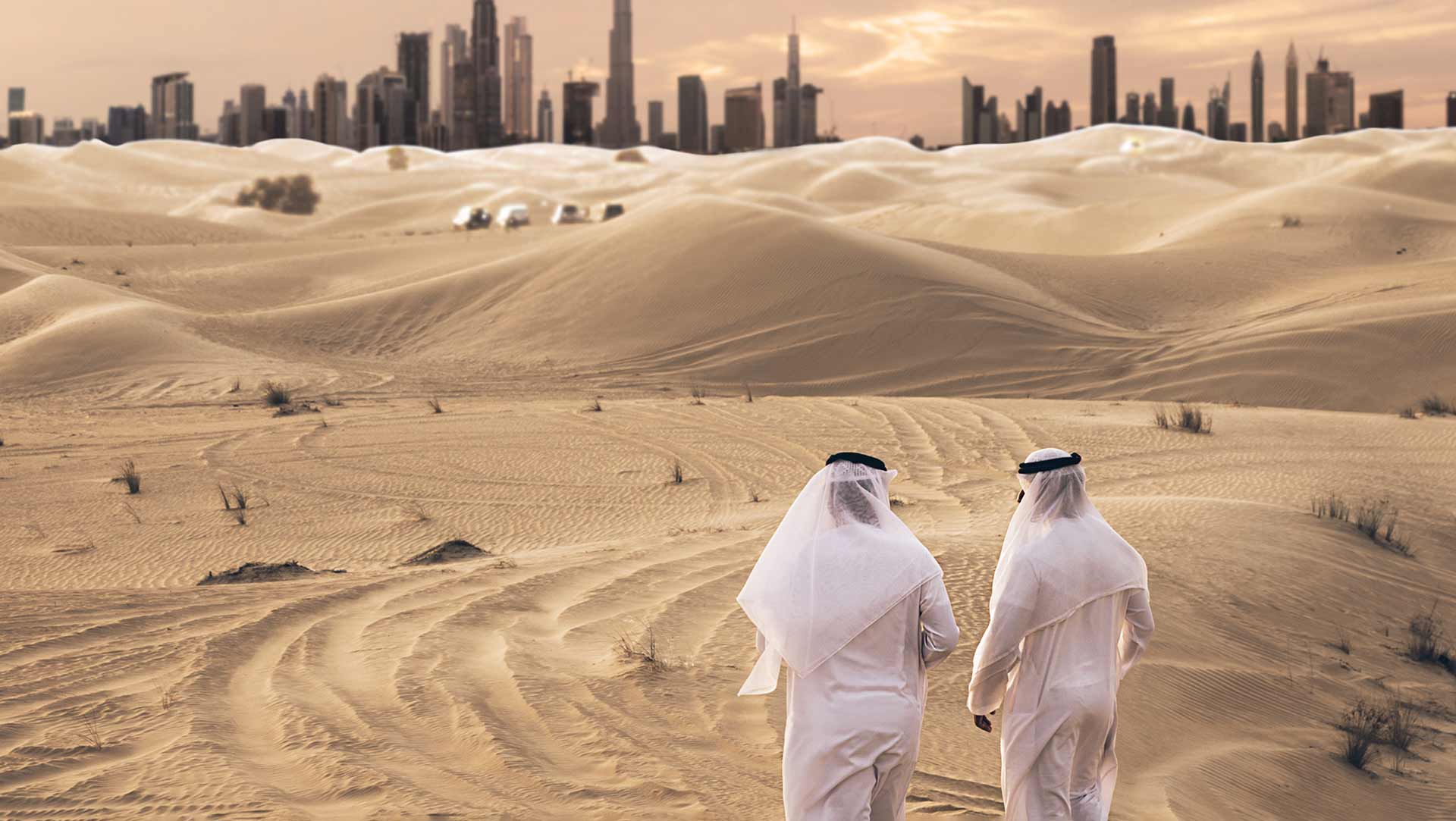Dubai, December 2021 – The UAE’s Golden Jubilee, the 50th year since the nation’s historic unification and founding in 1971, was celebrated last December 2, 2021. The celebration marks the day when the six emirates bound together to form the UAE, with Ras Al Khaimah joining as the seventh and final emirate the following year.
Derived from the vision and leadership of the late Sheikh Zayed bin Sultan Al Nahyan, the Founder of the UAE, the official theme of the UAE’s Golden Jubilee celebration is ‘Spirit of the Union.
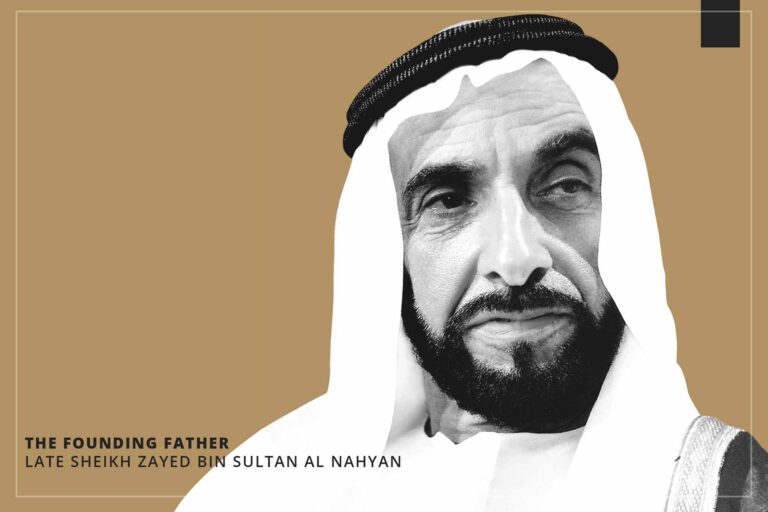
A historic day that marks a milestone for our country’s achievements. We pay tribute to the past 50 years of the founding of our country and together work towards the centenary.
Sheikh Abdullah bin Zayed, Minister of Foreign Affairs and International Co-operation
The Story Behind the Golden Jubilee
As the UAE celebrates its Golden Jubilee, let us remember the historical relevance of this occasion that paved the way for forming the UAE and its transformation. Historically, UAE was distributed into tribal groups. In 1820, Britain offered protection and was accepted by numerous tribes. Since then, Britain gained some control over the land until 1968, when it decided to remove itself from the picture after experiencing financial losses.
After Britain’s exit, Sheikh Zayed, the Founding Father, led efforts to unite the emirates to form the UAE. It had been an ongoing discussion for several years before the official founding of the nation, until the treaty with British officially ended and Emirate’s federal constitution was approved on December 1, 1971.
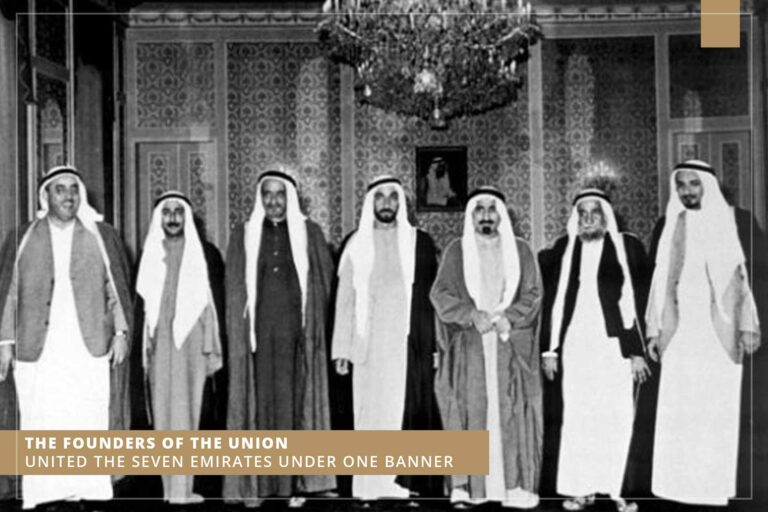
On the morning of the following day (December 2, 1971), the six estates announced their independence from Britain and signed an agreement to unite under a union in a place known as Dubai’s Union House. A few months after, Ras-al Khaimah decided to join. His Highness Sheikh Zayed bin Sultan Al Nahyan was nominated as the 1st official president, and Sheikh Rashid was elected as Vice President of the Union.
To mark the unity of the emirates, the country’s flag was adopted on the same day. Each colour symbolizes Arabian unity and represents different meanings. Red means power, white for peace, black for dignity, and green stands for success.
UAE Through the Years
The union of the seven sheikdoms under one banner on the 2nd of December marked a momentous milestone and paved the way for higher and greater ambitions. As a country united, the UAE achieved remarkable progress and industrialisation. In its early years, economic growth and development were spurred mostly by the oil sector, which had long been a focal point in the region.
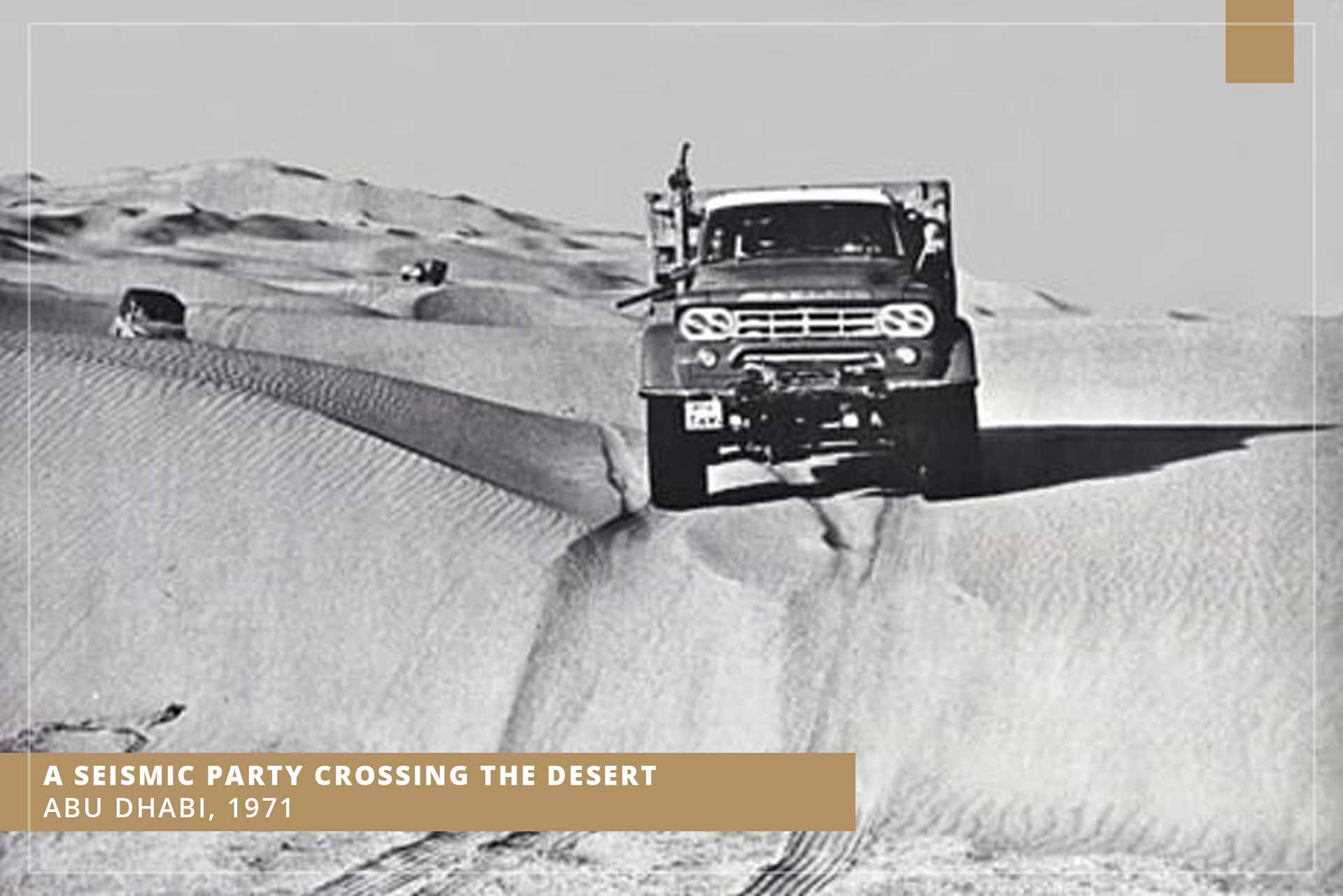
Abu Dhabi was the first to benefit from early oil explorations, with the discovery of oil at Bab in 1954. By 1967, the emirate had established itself as global supplier, joining the Organization of the Petroleum Exporting Countries and quickly becoming its fourth largest producer. With the founding of the UAE in 1971, however, the emirates had collectively secured a seat at the table, presenting a united front to the world.
In the same year, the Abu Dhabi National Oil Company (ADNOC) was created under the mandate of the UAE’s founding father, His Highness Sheikh Zayed bin Sultan Al Nahyan, as more oil fields were discovered, and oil production figured as a major source of revenue. Together, the UAE put forth a more concerted and coordinated effort to grow as a nation, and not merely as neighbouring sheikdoms.
The Emirate of Dubai was strategically positioned as a steady supplier of oil, while Abu Dhabi operated as a swing producer, increasing or decreasing production according to changes in output demand. This saw the country recording a Gross Domestic Product of $16.52 billion as early as 1976, according to data by the World Bank.
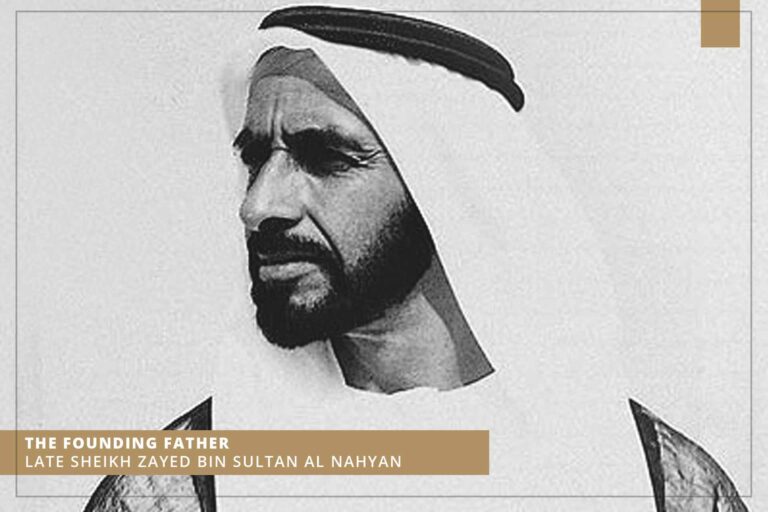
In all of this, Sheikh Zayed proved to be a key figure and mover. The UAE’s founding father deftly navigated relationships with foreign oil companies to increase exploration and production in the country. His vision was to leverage the country’s oil revenues to accelerate modernisation, and to this goal, he maintained a cooperative attitude with foreign operators that contrasted with the nationalist approach of other oil-producing countries in the region.
These initial steps eventually led to the nation’s rise to prominence in the oil sector, highlighted by milestones such as the country’s central role in the foundation of the Gulf Cooperation Council (GCC) and the creation of the Emirates National Oil Company in 1999. Today, ADNOC stands as a major global energy and petrochemicals company, with the capacity to produce 4 million barrels of oil per day, to service over 40 markets in 6 continents around the world.
A Future Beyond Oil
In line with Sheikh Zayed’s long-term vision, however, the UAE is diversifying from being an oil-driven economy on the back of the country’s accelerated modernisation efforts. Nowhere is this more evident than in the expanded contribution of non-oil sectors to the national GDP. Based on data from the Federal Competitiveness and Statistics Centre (FCSC), the contribution of non-oil sectors has expanded from 43% in 1975 to 93% in 2020. This growth is empowered by strong and definitive initiatives coming from the highest offices of government.
The contribution of non-oil sectors to GDP surged from 43 per cent in 1975 to 83 per cent in 2020.
Federal Competitiveness and Statistics Centre, as reported by the Emirates News Agency
In January 2012, His Highness Sheikh Mohammed bin Rashid Al Maktoum launched the Green Economy initiative, which is aimed at transforming the UAE into an international hub and a full-fledged green economy that can sustainably compete on the global stage. The initiative encompasses a comprehensive spectrum of programmes and policies covering energy, agriculture, investment and sustainable transport in addition to new environmental and constructional policies.
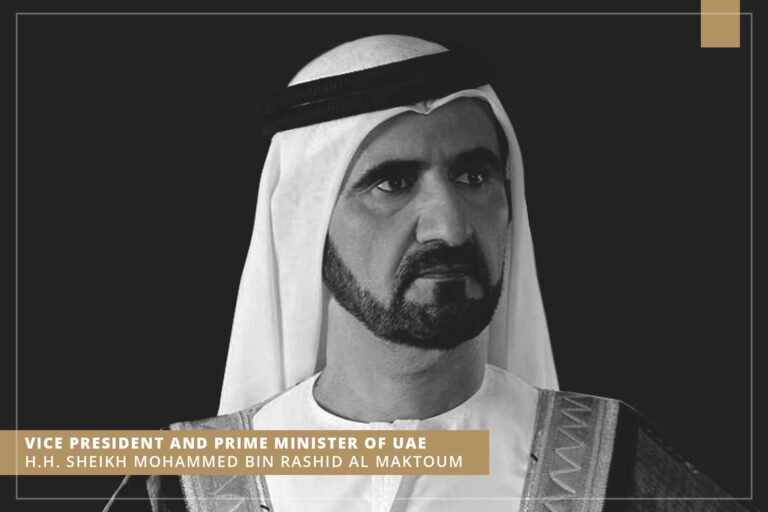
In the field of energy, the initiative looks to promote the proliferation of renewable energy sources on both the industrial and grassroots level. This includes the deployment of mega solar photovoltaic (PV) projects and the advancement of concentrated solar power (CSP) technologies, as well as programmes promoting the use of rooftop solar installations. Consequently, the country’s renewable energy capacity has grown significantly from 482 MW in 1975 to approximately 35,000 MW in 2020, with the total generated electric power exceeding 137,000 gigawatts per hour in 2020.
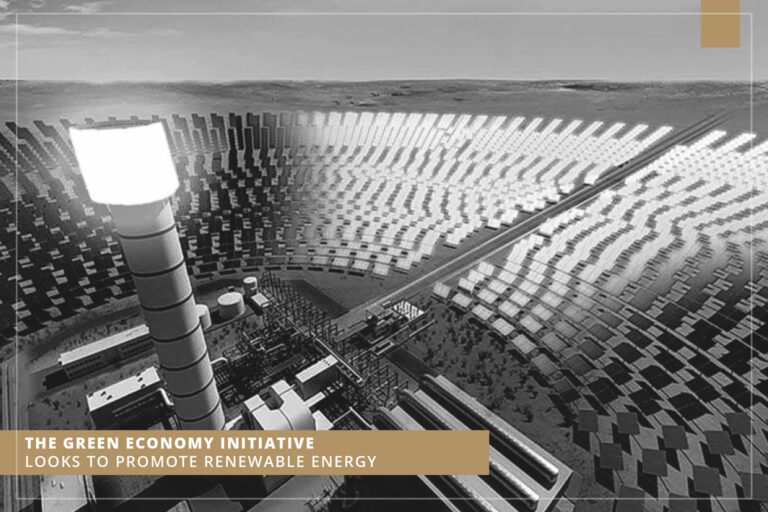
Another economic sector that has flourished over time is tourism. From 2.3 million arrivals in 1996, the UAE has managed to attract over 21.5 million visitors in 2019, according to data by the World Bank. The emergence of internationally renowned tourist attractions such as the Burj Al Arab, the Burj Khalifa, and the prime real estate of Downtown Dubai is representative of this growth. In 2019 alone, international visitors spent a total of AED 143 billion, with the travel and tourism sector representing 11.6% of the national GDP – a figure amounting to AED 180.4 billion.
With the rapid expansion of the tourism industry over the years, the UAE has transformed into one of the leading tourist destinations, not only in the region but the world.
The trade and investment sector has also made remarkable strides by increasingly inviting and stimulating foreign trade. This has resulted in the growth of the sector from AED 11.5 billion in 1975 to AED 1.4 trillion in 2020. Foreign direct investments (FDI) figured a key role in this growth, increasing by 82% from AED 40 billion in 2005 to AED 73 billion in 2020. Aided by an ecosystem that promotes small and medium enterprises, the business landscape of Dubai has also figured to be fertile ground for economic stimulation. According to the World Bank, the UAE ranks 16th in the world when it comes to Ease of Doing business.
The country has a wide range of free zones, where foreigners are allowed to set-up and own 100% of their businesses. This has spurred innovation and entrepreneurship within the private business sector, allowing the start-up scene to flourish across the country. Based on data released by the Dubai Startup Hub, 46% of SMEs in Dubai engaged in the export of goods or cross-border supply of services, signifying the global competitiveness of locally situated businesses. Behind strong support from the government, the UAE has seen the rise of incubators, accelerators, institutional investors, and co-working spaces – all towards inspiring creative, tech-aligned entrepreneurial pursuits.
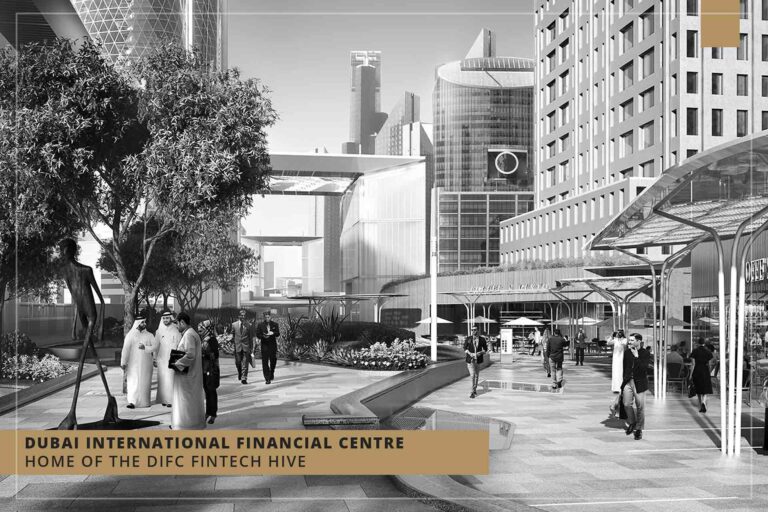
Institutions such as the DIFC FinTech Hive, Google for Startups, Founder Institute, Dtec, Dubai Startup Hub, and WeWork have surfaced to help entrepreneurs and start-up companies in the UAE take their ideas off the ground. Additionally, the UAE itself is gearing towards a future of digital transformation, with its positive stance towards technological innovations like blockchain and cryptocurrency. This is exemplified by the establishment of a dedicated Crypto Centre by the Dubai Multi Commodities Centre (DMCC) right at the heart of the free zone in May this year.
The DMCC Crypto Centre aims to provide a comprehensive suite of solutions for blockchain and crypto projects, including co-working spaces, learning programmes, advisory services, incubation, and networking. DMCC CEO and Executive Chairman Ahmed Bin Sulayem are confident that there will be “well over” 1,000 crypto businesses in the UAE by the end of 2022. This diversification from being a largely oil-backed economy is positioning the UAE as a premier location for international trade, business, technology, and finance.
Celebrations Across the Country
UAE National Day is a special event when locals and expatriates gather to celebrate. It is a public holiday declared by the UAE to bring families and friends together. This year is exceptional as it marks the 50 years since its historic unification and founding. Dozens of events took place in different parts of the UAE, including at malls, hotels, and restaurants, to celebrate this special occasion.
Expo 2020 Dubai prepared a four-day line-up of site-wide events and activities, including fireworks, a flypast, aerial stunts, celebratory ceremonies, musical showcases, cross-cultural conversations, cultural performances, and exhibits to celebrate the Golden Jubilee.
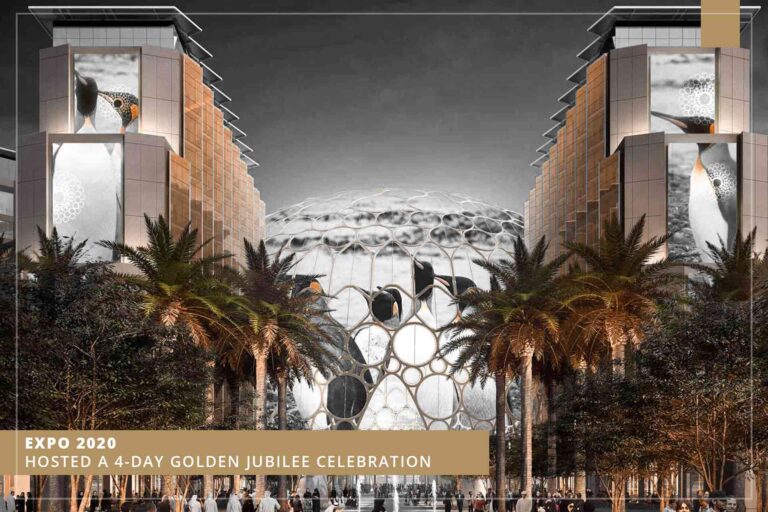
A total of 192 countries joined together to celebrate while hundreds of residents gathered and witnessed the grand ceremony at Dubai Expo 2020 last December 2, 2021. Addressing the gathering, Sheikh Nahyan bin Mubarak Al Nahyan, Minister of Tolerance and Coexistence and Expo Commissioner General, wished everyone a happy National Day.
I am thankful that you have joined us on this momentous journey and honoured to stand among this special moment and story of our nation… a story in which you have each played a significant part together.
Sheikh Nahyan bin Mubarak Al Nahyan, Minister of Tolerance and Coexistence and Expo Commissioner General
The UAE’s official National day celebration was held in the majestic natural landscape of Hatta, a historical connecting point of tribes and caravans, to mark the country’s 50th National Day. The event was attended by more than 1,400 individuals from 100 nationalities. UAE’s leaders, including His Highness Sheikh Mohammed bin Rashid Al Maktoum, Vice-President and Prime Minister of the UAE and Ruler of Dubai; Sheikh Mohamed bin Zayed Al Nahyan, Crown Prince of Abu Dhabi and Deputy Supreme Commander of the UAE Armed Forces; and several other rulers, deputy rulers, and crown princes were in attendance.
A powerful story of the nation in a 40-minute show features the UAE’s progress since the country’s union unravelled in an emotional visual scenery before the audience’s eyes. This spectacular event was witnessed by thousands of citizens and residents who watched the UAE’s journey from their TV screens. Staged in Hatta Dam and surrounded by the Hajar mountains, the floating theatrical experience is open to the public from Dec 4-12, 2021. The creative and artistic storytelling unites people and sheds light on the nation’s achievements of today while offering a glimpse of a better tomorrow.
Brighter Days Ahead
As the UAE gears up for global competitiveness over the next 50 years, advancements in technology and the digital space have taken precedence in its long-term vision. His Excellency Omar bin Sultan Al Olama, Minister of State for Artificial Intelligence, Digital Economy and Teleworking Applications, sees the digital economy as a fundamental driver for the implementation of the future strategies of the UAE government.
The digital economy is an important supporter of the efforts to enhance the competitiveness of the UAE at the global level, for its great contribution to economic development, providing job opportunities, new markets and emerging sectors, and its role in empowering society with the tools of the Fourth Industrial Revolution and advanced infrastructure in the field of technology and innovation
Omar bin Sultan Al Olama, Minister of State for Artificial Intelligence, Digital Economy and Teleworking Applications
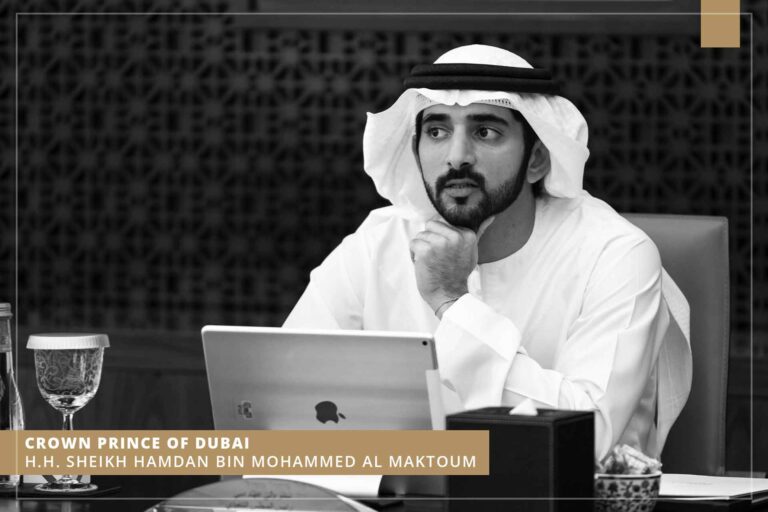
By taking steps towards technology and innovation, the country increasingly diversifies away from oil. More importantly, it aligns the country to a future of sustainability and green technology. Government-led efforts such as the Dubai Blockchain Strategy launched by His Highness Sheikh Hamdan bin Mohammed bin Rashid Al Maktoum, Crown Prince of Dubai and Chairman of Dubai Executive Council, put the country in prime position to lead the region into a digital future. With its resources and vision, the UAE stands to become one of the most advanced and formidable economies, not just in the region but also the world.

